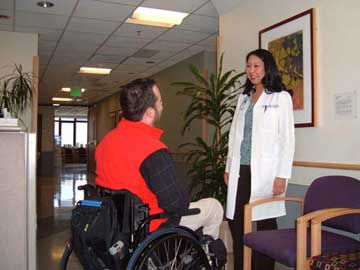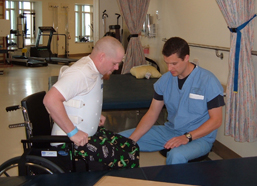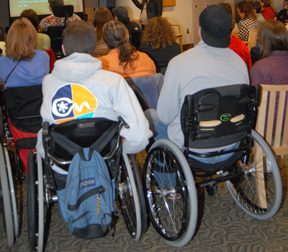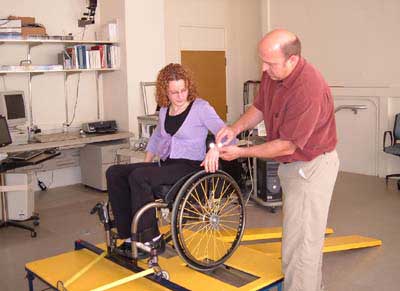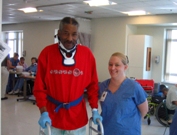SCI Forum Reports
Service Dogs for Persons with SCI
Resources on this topic are listed at the end of this report
November 12, 2002
Service dogs for persons with disabilities are in high demand, and the organizations that train and supply dogs to this population usually have long waiting lists, sometimes seven years or more. The Prison Pet Partnership Program (PPPP) http://members.tripod.com/~prisonp/ , whose waiting list is only one to three years, is a unique program combining dog rescue, prison vocational training, and free service dogs to persons with disabilities. Begun in 1981, it is located in the Washington State Corrections Center for Women in Gig Harbor, Wash. PPPP Training Coordinator Susie McGehee came to the forum with Sage, a mixed-breed dog rescued from a shelter and currently in training.
"We select our dogs from shelters, which are pretty stressful environments," McGehee said. PPPP does general temperament testing to rule out major problems, like biting, fear of loud noises, shyness of people. "The dogs go everywhere so they need to be stable around all sorts of noises, visuals, men and women. We typically go for lab/retriever types because they have good temperaments and are people-oriented."
"It takes a lot to train service dogs, especially when you rescue them and have prison inmates-who are in training themselves-do the training," said McGehee. "We're starting from scratch with trainers and dogs. Training takes six to twelve months, depending on the dog's age and behavior issues."
The working life of a service dog is 6-8 years, and retirement is around 8-10 years old, according to McGehee. "But if you're not using your dog for bracing or other heavy tasks, working life can be 13-14 years." Life span is a big issue for people getting service dogs because "that dog's not always going to be with you. The relationship is like a marriage. You're actually with your dog close to 24 hours a day, more than you're with your spouse. So you get really close to your dog."
Depending on the tasks required, some people don't necessarily need a large dog. "You may only need what's called a 'laptop' dog," she said. "(Service dogs) can be all sizes. We like to start big because then they have more to offer."
It costs $10,000-$15,000 to train a service dog. "Programs that do charge often help you through the process of raising money for the dog," McGehee said. "Our program doesn't charge (besides a $25 application fee) because we have other sources of funding. Our programs are subsidized through the (fee-based) boarding and grooming program the inmates run, and we are a non-profit and able to get grant funding from foundations. This is not typical. We place dogs in Washington, Oregon and Idaho only; this also keeps costs down."
The shortage of service dogs, and hence the long waiting lists, are due to a lack of dogs and trainers both, McGehee explained. "Since we rescue and work with novice trainers, our success rate is lower. But even in breeding programs, lots of dogs get dropped because of hip and elbow problems, even if they have perfect temperament." The service dog business is a relatively new industry, she added, and there aren't many opportunities to get trained as a trainer.
"Standard poodles are a good breed but they are expensive and you don't find them in shelters very often," she added.
Jean*, who has C6-7 tetraplegia, became frustrated with the long waiting lists at many service dog organizations and chose to get a dog from a breeder and train it privately. "The main part is deciding what kind of dog you want. I decided not to go with a dog that slobbers or sheds. I chose a standard poodle. They're smart."
Allen*, who has C-5 tetraplegia, waited seven years to get his dog from Canine Companions for Independence (CCI). Unfortunately, CCI has closed their waiting list and is not accepting applications at this time, he said. "It's been a great experience getting a dog. Sometimes (CCI) has release dogs that don't make it as service dogs but make great companion dogs. Only 40% make it through."
"We call (the companion dogs) 'home helpers,'" McGehee said. "They're basically a step below a service dog. They don't have public access rights."
Most of what Allen's dog does is retrieve items he has dropped. "I'm sure you know that when you drop something, it might as well be on Mars," Allen said. "He can pick up just about anything-a piece of paper, a quarter." Allen dropped a pen and said "fetch." His dog gingerly picked it up in his mouth and returned it to Allen, wagging happily.
Before getting his dog, Allen worried about shedding and dealing with dog waste. "But it's all worked out. I give him a command for going to the bathroom (in the yard), and the attendant goes out and scoops it. My dog sheds, but my attendant vacuums every day."
While service dogs need to be friendly, they can't be so outgoing that people could easily steal or coax them away. According to McGehee, training stresses that the reward comes after the dog does what the owner tells it to do, not if someone else gives it a command or tries to pet it or take it away. "It's not foolproof. If you have a seizure disorder and go into a seizure and they have to put you in an ambulance, your dog needs to be willing to go with someone else. The dogs have to kind of learn to think."
Some people worry that they won't be able to provide enough exercise for the dog or that it will get too bored. "Lying down is 90% of what a service dog does, and we select dogs that are okay with that," McGehee explained. "We've flunked many dogs because they just couldn't do this."
Allen's dog gets off-leash time in the yard rather than in off-leash areas or other public places. "Canine Companions doesn't recommend letting your dog play with other dogs," he said.
McGehee concurred. "Aggressiveness in other dogs can be a major issue for service dogs: if your dog has too many situations when he is threatened or attacked, that can become a problem. Service dogs need to be docile."
* Names have been changed to protect privacy.
Resources:
- Prison Pet Partnership Program
PO Box 17
Gig Harbor, WA 98335
253-858-4240
Web site: http://members.tripod.com/~prisonp/
Email: ppppsd@yahoo.com
- Assistance Dog Club of Puget Sound
7898 Greyhawk Ave.
Gig Harbor, WA 98335
253-853-1984
Web site: http://www.dogsaver.org/adc
Email: assist_dog_club@hotmail.com
- Summit Assistance Dogs
5458 W. Shore Rd.
Anacortes, WA 98221
360-293-5609
Web site: http://www.SummitDogs.org
Email: info@summitdogs.org
- Paws with a Cause
4646 South Division
Wayland, MI 49348
800-253-PAWS/616-877-7297
Regional representative: Joyce BiethanSeto, 360-668-0611
Web site: http://www.pawswithacause.org
Email: paws@ionline.com
- Delta Society
Service Dog Education System
289 Perimeter Rd East
Renton, WA 98055
425-226-7357
Web site: http://www.deltasociety.org
- Canine Companions for Independence (CCI)
2965 Dutton Avenue
PO Box 446
Santa Rosa, CA 95402
1-800-572-2275/707-577-1700
Web site: http://www.caninecompanions.org/

